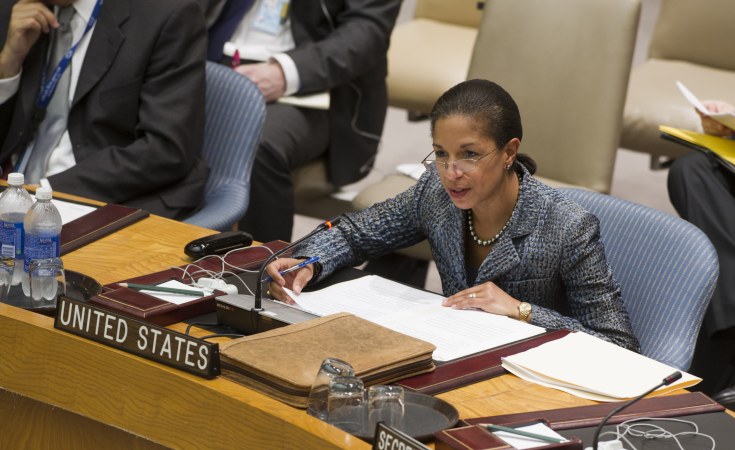Cape Town — As President Barack Obama decides whom to nominate to replace Hillary Clinton as secretary of state during his second term, Africa specialists in the United States are beginning to turn a critical gaze on the U.S. permanent representative at the United Nations, Susan E. Rice.
Amid speculation that Rice is on Obama's list for the post, a heated and partisan debate has been generated in Washington by her statements soon after the killing of the American ambassador to Libya, Christopher Stevens, to the effect that his death was a consequence of a spontaneous protest against an anti-Muslim film rather than a pre-meditated attack by militants. Her explanation prompted vigorous attacks by Republicans, who said they would oppose her nomination as secretary.
Obama hit back angrily, suggesting she was being targeted for simply conveying intelligence she had received. He said he had not yet decided whom to propose to replace Clinton, but if he thought Rice "would be the best person to serve America in the capacity of the State Department, then I will nominate her".
Behind the domestic furor over events in Libya, some Africa specialists in the United States are questioning her suitability on the basis of her record on Rwanda, the Democratic Republic of Congo and other east and central African nations, going back to the 1990s when she held posts in the administration of former president Bill Clinton.
Jason K. Stearns, a former United Nations official and director of a project of the Rift Valley Institute, charged in a recent blog post that "guilt over her inaction" on the Rwandan genocide of 1994 and "frustration" with Congolese leaders in the same era had led to Rice developing sympathies with the post-genocide leadership of Rwanda.
Stearns accused Rice of protecting Rwanda, then Uganda, during this year's controversy over a report by a UN Group of Experts which said the two governments were backing the DR Congo's M23 rebels. He alleged that "Rice has emerged as a holdout within American foreign policy, a sort of minority report to the prevailing criticism of Rwanda and the M23."
The latest contribution to the debate came from Howard French, an associate professor of journalism at Columbia University, New York, who was a New York Times correspondent in Africa during the 1990s. He has long been skeptical of reporting on the Rwandan genocide which treats the post-genocide government, now headed by President Paul Kagame, as the "good guys" of Central Africa.
In an article this week in the U.S.-based publication, The Atlantic, French portrayed Rice as perhaps the American government official who had played "a larger and more sustained role" than any other in shaping U.S. Africa policy in the last 20 years.
He too took issue with her attitude to Rwanda, and argued that although she was not the only person responsible, she had followed a Cold War approach of seeking African allies among authoritarian leaders with whom the U.S. could do business.
Citing Kagame, Uganda's President Yoweri Museveni and Ethiopia's former prime minister, Meles Zenawi, in his article, French quoted a former American official as saying Rice had "venerated" leaders who had become "repressive autocrats and despots who feel like they can manipulate the outside world to give them lots of space..."
If Rice survived the current controversy over Libya, French said, "understanding the details of her past work in Africa, and drawing her out about Washington's approach toward the continent in the future, should be a matter of serious national concern".
RELATED
The Rice Stuff [Witney Schneidman]
Amb. Susan Rice as a Window into US Africa Policy, 1993-Present [Alex Thurston]
Susan Rice Role In Lead-Up To Africa Embassy Bombings Recalled As Minimal [Joshua Hersh]
The Controversial Africa Policy of Susan Rice [Armin Rosen]
Why the Latest GOP Attack on Susan Rice Is Bogus [David Corn]


